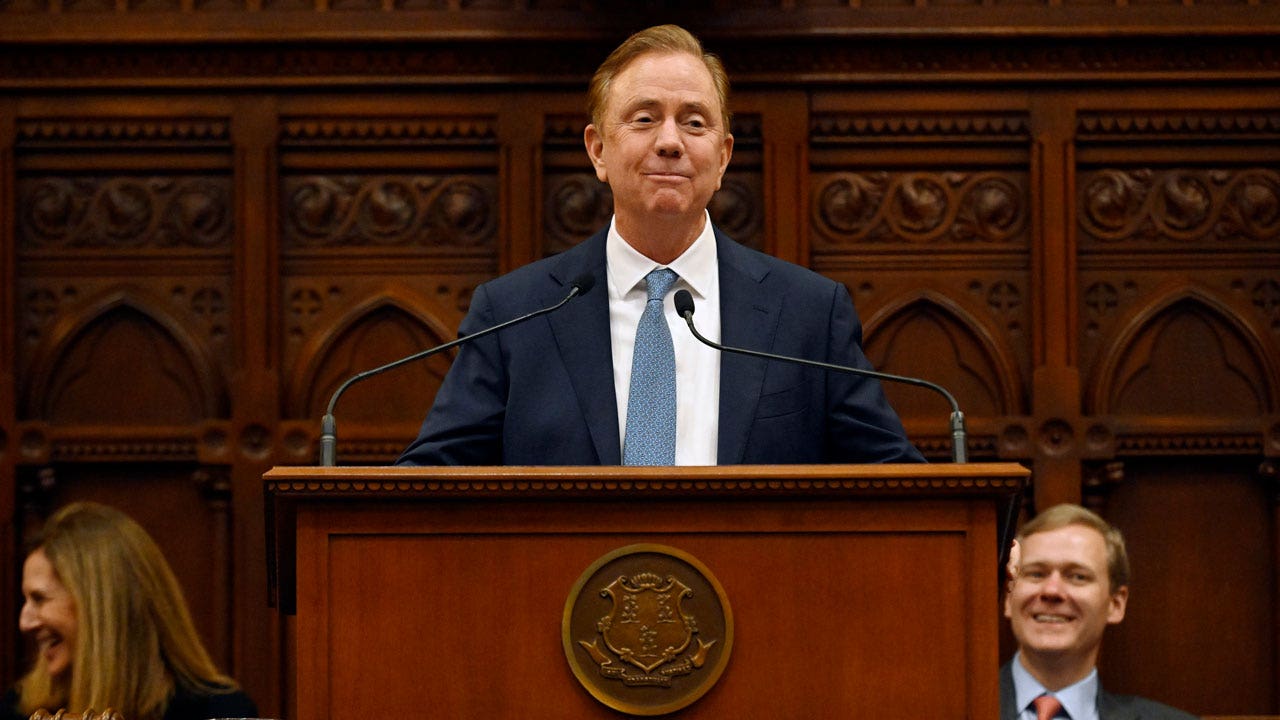Nearly a decade after Connecticut was infamously described as being in a ‘permanent state of fiscal crisis,’ struggling year after year to balance deficit-ridden budgets, Democratic Gov. Ned Lamont on Wednesday proposed the state’s first income tax reduction in nearly 30 years and its largest ever.
Lamont said the state’s fiscal health is now the strongest it’s been in decades, enabling officials to finally focus on addressing Connecticut’s nagging reputation of being a high-cost state.
‘For the first time in over a generation, Connecticut has enjoyed strong economic and population growth,’ he told a joint session of the Democratic-controlled General Assembly. ‘And more taxpayers, a growing economy, coupled with our shared fiscal discipline, has resulted in four consecutive balanced budgets, soon to be five.’
Lamont’s two-year, $50.5 billion budget plan, which still needs legislative approval and faces some pushback from liberals in his party who support raising taxes on the wealthy, would reduce personal income tax rates.
Families, for example, would see their tax rate of 3% on the first $20,000 of earned income and 5% percent of income up to $100,000 a year drop to 2% and 4.5%, respectively. That’s in addition to Lamont’s proposal to increase the earned income tax credit, ensuring families making less than $50,000 will pay no state income tax. More than 200,000 low-income workers are eligible for the credit
Combined, the two proposals are predicted to save low- and middle-income taxpayers nearly $500 million a year.
Lamont also called for increasing funding for affordable housing, childcare programs and local education and canceling overdue medical debt for thousands of residents. And he proposed fully restoring a tax credit that helps business owners avoid a $10,000 federal cap on state and local tax deductions, as well as expanding a tax credit for corporations that provide job training, childcare subsidies, tuition reimbursement and other services to their employees.
Republicans, who welcomed Lamont’s willingness to cut taxes, say it’s time to start giving back to taxpayers, especially considering the current fiscal year is expected to end with a $1.3 billion surplus.
‘I think there’s still a real affordability issue in the state of Connecticut,’ House Minority Leader Vincent Candelora said. ‘So while government has been working well for itself, the residents don’t feel that way.’
Veteran lawmakers acknowledge the prospect of debating which taxes this session to cut is a marked difference from 2014, when former Democratic Gov. Dannel P. Malloy’s budget director, Ben Barnes, warned that the state was in ‘a period of permanent fiscal crisis.’
At that time, Connecticut had experienced multiple years of projected budget deficits and massive unfunded state pension liabilities, forcing Malloy to raise taxes, lay off state employees and cut programs to balance the books.
Lamont and state legislators credit a package of bipartisan fiscal ‘guardrails’ imposed in 2017 for leading to billions of dollars in surpluses in recent years. Those budget controls, which the General Assembly is expected to renew on Thursday, include caps on spending and revenues, including potentially volatile stock market earnings that Connecticut has traditionally relied on heavily.
Despite those reforms, Connecticut still faces challenges, including roughly $88 billion in unfunded pension liability and debt.
‘I think there’s a lot of room for optimism. I also think we need to have some cautious optimism. Why? Because we still have significant long-term liabilities that aren’t addressed,’ House Majority Leader Jason Rojas said. ‘I still think we’re in this kind of transition period in terms of our state’s economy.’


































